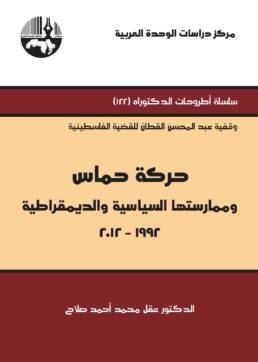The Center for Arab Unity Studies published the book The Palestine National Movement in the Twentieth Century, by Abdel Qader Yassine.
This book covers an unprecedented period of time in the contemporary economic, social and political history of Palestine, spanning through the twentieth century, from the beginnings of the implementation of Western colonial projects and the Zionist project in Palestine and the region following the collapse of the Ottoman Empire after World War I, and the Palestinian liberation movements that resulted from these projects, all the way till the Oslo Accords and the establishment of the Palestinian Authority, and what resulted in terms of the weakening of the Palestinian national project and its national movement.
This broad analytical historical work divides the Palestinian national movement into phases, each of which bore special features, closely related to the economic and social developments of Palestine and the transformations of the Arab environment; Starting with the development of the Palestinian national movement under the British occupation of Palestine until the occurrence of the Nakba in 1948; Then the stage of sporadic social and political struggles in Palestine and the region, up to the defeat of 1967, and the launch of Palestinian action abroad, before the Palestinian resistance factions left Jordan (1970-1971) to Lebanon, which these factions soon left after the Israeli invasion (1982). This reduced the dependence of inside Palestine on the resistance abroad and led to the “Intifada” (1987-1991), that was misused by the influential Palestinian leadership- which slipped into “Oslo Accord”, and resulted in a self-rule authority but with restricted will and options.
Add a review
You must be logged in to post a review.
You May Also Like
Hamas: Its Political and Democratic Practices, 1992-2012
Price range: 8 $ through 13 $
Imagining the Holy Land: How Was the Palestinian Map Hebraized?
Price range: 10 $ through 13 $
Post-Zionism
Price range: 4 $ through 6 $
The Beginnings of the Arab Awareness towards the Zionist Project Dangers,1897-1917
Price range: 7 $ through 11 $
The Palestinian Cause and the Isreali Problem: A New Vision
Price range: 6 $ through 10 $
The Palestinian Question: A Spot of Light in a Dark Arabic Reality
Price range: 6 $ through 10 $
Digital Palestinian Memory: Forms, Challenges, and Future Prospects
Price range: 10 $ through 13 $








